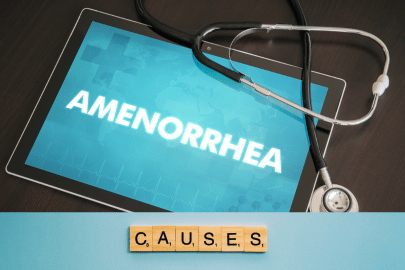Missing a period can be an unsettling experience, especially if it’s unexpected. Amenorrhea, or the absence of menstruation, can be a natural occurrence in some cases or an indicator of underlying health issues. This article explores the causes of amenorrhea, its symptoms, and what it might mean for your overall health.
What Is Amenorrhea?
Amenorrhea refers to the absence of menstrual periods in women of reproductive age. It is classified into two types:
• Primary Amenorrhea: When menstruation hasn’t started by age 15.
• Secondary Amenorrhea: When a woman who previously had regular periods misses three or more cycles in a row.
It’s important to distinguish amenorrhea from irregular periods, as the causes and treatments differ.
Common Causes of Amenorrhea

1. Natural Causes
- Pregnancy: The most common cause of missed periods.
- Breastfeeding: Hormonal changes during lactation can delay the return of menstruation.
- Menopause: The natural end of menstruation, typically occurring around age 50.
2. Hormonal Imbalances
- Polycystic Ovary Syndrome (PCOS): Elevated androgens can disrupt ovulation and lead to missed periods. Learn more on our PCOS page.
- Thyroid Disorders: Both hyperthyroidism and hypothyroidism can interfere with menstrual cycles.
- Hyperprolactinemia: High levels of prolactin, often caused by a pituitary gland issue, can suppress menstruation.
3. Lifestyle Factors
- Extreme Weight Loss or Gain: Significant changes in body weight can disrupt hormone levels.
- Excessive Exercise: Intense physical activity, especially combined with low body fat, may suppress ovulation.
- Stress: Chronic stress can affect the hypothalamus, a part of the brain that regulates menstrual cycles.
4. Structural Issues
- Uterine Scarring (Asherman’s Syndrome): Scar tissue in the uterus, often caused by surgery or severe infections, can block menstruation.
- Congenital Conditions: Certain birth defects may prevent menstruation in women with primary amenorrhea.
Symptoms Associated with Amenorrhea
In addition to missed periods, women with amenorrhea may experience:
- Headaches or vision changes (if related to pituitary disorders).
- Hair loss or excessive hair growth (associated with PCOS).
- Acne or oily skin.
- Hot flashes or night sweats (related to menopause or hormonal imbalances).
- Pelvic pain or discomfort.
Diagnosing Amenorrhea

To determine the cause of amenorrhea, your healthcare provider may recommend:
1. Medical History and Physical Exam: Assessing lifestyle factors, medical conditions, and symptoms.
2. Pregnancy Test: To rule out pregnancy as a cause.
3. Blood Tests: To measure hormone levels, including FSH, LH, thyroid hormones, and prolactin.
4. Imaging Tests: Ultrasound or MRI to check for structural abnormalities or ovarian conditions.
5. Endometrial Biopsy: In rare cases, a biopsy may be needed to evaluate the uterine lining.
Treatment Options for Amenorrhea
Treatment depends on the underlying cause and may include:
1. Lifestyle Changes
- Maintaining a healthy weight and balanced diet.
- Reducing stress through relaxation techniques like yoga or mindfulness.
- Adjusting exercise routines to avoid overexertion.
2. Hormonal Therapies
- Birth Control Pills: To regulate cycles and restore hormonal balance.
- Thyroid Medications: For those with thyroid disorders.
- Progestin Therapy: To trigger a period and shed the uterine lining.
3. Medical Interventions
- Surgery: For structural issues such as uterine scarring or congenital conditions.
- Fertility Treatments: For women with amenorrhea who are trying to conceive.
Explore how hormonal therapies can help manage menstrual health on our Menstrual Cycle Basics blog.
When to Seek Medical Advice
It’s time to consult a healthcare provider if you:
- Haven’t had your first period by age 15.
- Miss three or more periods in a row without an obvious cause.
- Experience symptoms like pelvic pain, hot flashes, or abnormal hair growth.
- Are struggling to conceive due to irregular or absent periods.
Timely diagnosis and treatment can prevent complications such as infertility, osteoporosis, or chronic health issues.
Supporting Your Menstrual Health
Tracking your symptoms and menstrual patterns can help you and your healthcare provider identify potential causes of amenorrhea. Use a journal or app to record:
- Cycle regularity.
- Symptoms like cramping, fatigue, or mood changes.
- Lifestyle factors such as diet, stress, and exercise.
If you’re experiencing missed periods or other menstrual irregularities, the Women’s Center of Athens is here to help. Schedule an appointment with our experienced physicians for a thorough evaluation and personalized care plan.


